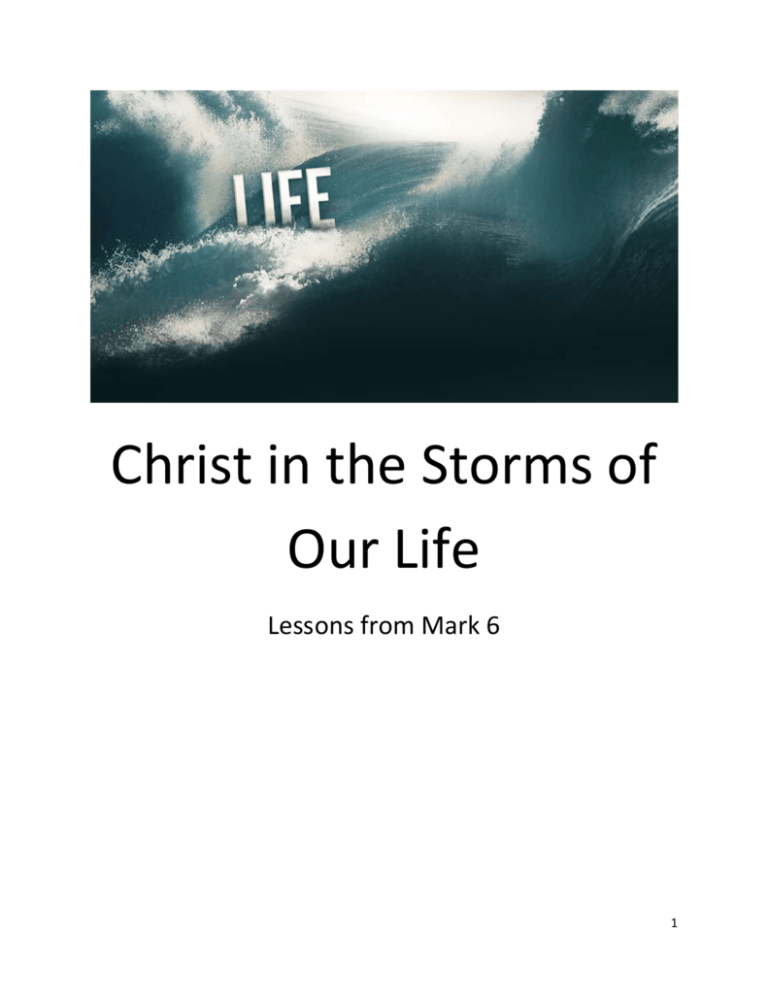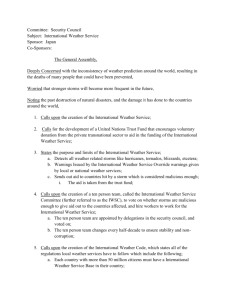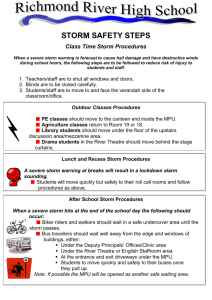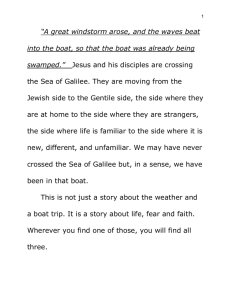Christ in the Storms of Our Life Lessons from Mark 6 Life without
advertisement

Christ in the Storms of Our Life Lessons from Mark 6 1 Life without storms is not genuine living. “Why,” you ask? Because everyone will experience turbulent weather, broken relationships, financial challenges, difficult children, harsh mates, demanding employers, a doctor’s summazation from medical tests, the inconvenience of a dead battery the day of an important business meet, the decline of an aging parent, a flight cancellation after several weeks in several countries; and I am sure you can add to this list from your personal life’s experiences. We often think we are the only ones going through this storm. We often believe no one seems to care what I am experiencing. We can have harmful emotional responses to these storms increasing the deafening thunder and tornado force winds! Christians can act like unbelievers in the storm. We can manipulate people or circumstances to minimize or defuse the darkness in our attempts to command the sun to shine and the skies to become clear and blue. But all of us must come to realize that storms are not arbitrary but serve a purpose. For the unbeliever these are strange words. They might listen to this and shout that this belief is a rubber crutch to avoid personal responsibility and action. “Pull yourself up by your own bootstraps,” they shout! But this philosophy, if it works, does not resolve the problems but postpones the inevitable. But for the believer, we must connect this head knowledge to our will to live out the truth. The heart of motivation to obey is directly linked to the true knowledge of Him who does all things well for His glory and our good. Therefore, storms of life have purpose, meaning, and should result in another level of maturity. Our spiritual reality should increase not decrease as a result of the storms of life. Mark 6:45-52 records Jesus walking on the water. This account is recorded in the Gospels of Matthew and John. If you examine the parallel accounts the endings seem contradictory. Each ends slightly different. But they are the same account. The endings were designed by the Holy Spirit for the audience which would read the inspired account. Matthew was written to the Jews and includes Peter’s attempt of walking on the water. Mark and John do not record Peter’s attempt. John ends abruptly while Matthew shares that after the storm is calmed they worshipped Jesus as the Son of God. But Mark does not end his account that way. He ends with recording that the disciples had gained no insight from the miracles of the loaves and fishes and their hearts were harden. All accounts are true because they are inspired by God and profitable for teaching. The Gospel writers were guided by the Spirit as to what to include and how to conclude their account. 2 After the feeding of the 5000 men, Jesus sends the disciples away to Gennesaret crossing the Sea of Galilee. The Greek word for “made His disciples get into the boat” is a very strong word. It means to command, compel, or strictly charge. Why is Jesus so insistent? John records that the crowds were attempting to crown Jesus as King. They were going to force Jesus into His role of Messiah. Their motivation was His miracles and power, not His message. Jesus knew His disciples and did not want them influences to join in with a “mob” mentality fueled by anger at the Romans and emotionalism because someone provided earthly sustenance. Jesus dismisses the crowd and retires to the mountain to pray. It has been a long taxing day of service and ministry to the disciples and others. Jesus finds refreshment in the presence of His Father. The Gospels often record Jesus rising early to communion with the Father and at times late into the evening. By this time, the disciples were several miles across the Sea of Galilee heading to their destination. But an unusual storm arose on the Sea of Galilee. It was of such a magnitude the disciples were unable to control the boat or its direction. They were unable to reach landfall. They feared they would not reach their destination; that the boat would sink and they would drown. It records that Jesus sees them straining on the oars. The idea of straining is great effort, labor, and exhaustion. It was between 3-6 AM when this storm swept down the hills of Galilee onto the sea causing it to churn relentless. Jesus walks on water toward the disciples. In all three accounts Jesus speaks to them to take courage and He identifies Himself. Why? The disciples thought this figure was a ghost. Some commentators explain this as the combination mist of the storm, the huge waves, and the darkness, and perhaps an overshadowed moonlight creating this illusion. Jesus enters into the boat. The storm relents, the sea calms, and the winds die down. Mark records that the disciples were astonished which means to be thrown out of position, to be amazed, or to be thrown into wonderment. Mark explains this astonishment – the disciples failed to connect Christ’s power of nature (loaves and fishes) to this miracles over a different form of nature, and their hearts were hardened. The word harden means to make the heart dull, to grow hard, callous, become dull, and lose the power of understanding. Were they exhausted from the day’s ministry? Was life with Jesus becoming plain and drab? Were they sleep deprived? Were they begrudging another anticipated crowd Jesus would minister to and they would be enlisted to help? It simply says their hearts were harden. 3 I want to share several principles you can employ with a counselee who wonders about Christ and the storm they are going through. 1st. Obedience can lead to storms in life. The disciples were obeying the Lord. Yet, Christ sent them directly into a storm. Christ is omniscient. He knew the storm was approaching. He knew the disciples would not be able to navigate this storm. Christ is also sovereign. He controlled the intensity of the storm. He controlled the timing of the storm. He knew who would be touched by the storm. He knew the outcome of the storm. Guide the counselee into personal reflection about their storm. Is this storm the result of consequences of sin? If so, the immediate necessity is confession and repentance; then endurance for any ongoing effects of the consequences. Is the storm because the counselee is obeying the Lord? What was the counselee commanded to do? Find the scriptural support. Dispel notion that God’s will is a bed of roses without thorns. God’s will is often difficult and challenging; but the revealed will of God comes with the power, presence, and promises of God. 2nd. The Lord is praying for the counselee. The Bible reminds us we have a sympatric High Priest who ever lives to make intercession for us. If Jesus sends us smack dab into a storm and then prays for us this seems rather cruel and unkind. However, there are numerous passages of Scriptures that reminds us those trials, temptations, and tribulations are awaiting those who live godly. Jesus is praying for the desired outcomes from the storm. Remember that James tells us to allow endurance in the storm to have its perfect work because we are lacking in some quality or character that only the storm will perfect and mature us. Jesus prays for us always and especially in the storms of life. 3rd. The Lord sees our feeble self-efforts to control the storm. How senseless and often arrogant of us to think or believe we can control the intensity and outcome of the doctor’s report, the dead car battery, the spouse who files for divorce, or the job loss. Because Christ is omniscient He knows the intentions and thoughts of our hearts. He sees us straining at the oars to recover and redirect the effects of the storm. But as hard as we try, regardless of the many solutions we discover and employ, the storm remains and we are at its mercy. God wants us to cry out to Him. He is sovereign and because the storm has meaning and significance for us and for Him, He allows us to struggle in our manipulation until we relent and repent. Proud people during storms work harder, run faster, scheme, connive, and manipulate. A proud person during a storm hardly ever gives up and relinquishes control. That would be a direct act of defeat and proud people don’t go down easily. But a humble person realizes when they are beyond their ability, when they themselves cannot do anything about the storm, and like the Psalmist cry out to God! 4 4th. God always comes even if it is in the darkest hour of the storm. I think for most humans any storm, whether at its start, in the middle or near the end is the darkest hour. God knows when the darkest hour is and always when to come. His delay is not vindictive. It is not punitive. His delay is instructive. His delay is intended to be edifying in that we learn something about our weakness and His greatness. His delay will bring a greater enlightenment to our souls. God comes because He is faithful to Himself and His promises. So during a storm what are some of His promises made to the counselee? He is faithful to us. His faithfulness is a guarantee of His presence and power in the storm. 5th. The Lord comforts, chides, and calms the storm in our life. The disciples are terrified. Perhaps because of the sudden onslaught of the storm and perhaps because of the lack of their perception of the image walking on the water. The encouragement Jesus provides is the command to take courage. When Joshua faced assuming filling the sandals of Moses as a leader God issues the same command to him. Take courage. How comforting that courage is available. Courage is as close as I think the Lord is to me in the storm! Courage is Christ personified for Christ identifies Himself to the disciples in the storm. Does the counselee see Christ in their storm? If not, they will be fearful. They even might become dominated by the fear (Greek word for afraid is phobos - a paralyzing emotions that hinders action). In Matthew, Peter is chided for his little faith. Although Peter is singled out in Matthew, in Mark and John all the disciples were afraid whether in the boat or on the water. There was a disconnect in their observations and thinking from all the time they spent with Jesus; listening to Him, watching Him, miracle after miracles, and His authority in teaching unlike the Pharisees. The storm ceases when Jesus entered the boat. As long as Christ was outside the boat, the storm raged. Inside the boat, the storm ceased. 6th. We must remember, move forward or stall. When the Lord told the disciples to get into the boat, He told them to go to the other side. Their destination was forecasted, predicted, and because Christ spoke it was assured. Christ did not say that sailing across the Sea of Galilee would be smooth. He did not say the possibility of storms would not assail them. He told them to go to the other side. The destination was assured. The desired results from the storm would be determined by the disciples’ response. From Mark, they failed to connect Christ’s previous power over nature (bread and fish in multiplication) to that same available power over winds and waves. Mark charges them with hard hearts. There was a dullness, they had grown hard, and they were displaying a loss of understanding. Matthew records they worshipped. I suspect the chronology may be that initially they failed to comprehend but by the time they reached the shoreline they were worshipping. Their got spiritually reconnected with who this man really was. 5 Jesus is always in the mist of our storms of life. He is always in control of the storms of our life. He regulates the intensity of the storms of our life. He is always praying for us in the storms of life. He will always come to us in the storms of our life. And we must always worship Jesus in the storms of our life. 6



